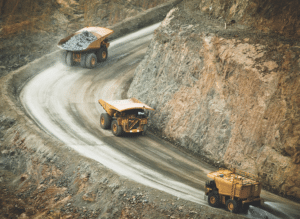TotalEnergies, which is helping Australian mining operators find creative ways to limit their carbon footprint, details the importance of advanced lubricants.
The mining industry, an integral driver of economic progress, finds itself at a crossroads amid a global shift towards more sustainable energy.
This transition signifies a pivotal moment, demanding innovative approaches to balance economic growth with environmental responsibility.
As a global multi-energy company, TotalEnergies has been supplying mines with their energy needs for many decades, while also helping them meet their decarbonisation goals.
Within this new landscape, lubricants have emerged with a crucial and frequently underestimated position.
As the mining industry further aligns with energy transition goals, lubrication stands as a foundation for enhancing equipment performance, minimising wear, and optimising resource utilisation.
The use of advanced lubricants not only maintains efficiency but contributes to the broader goal of mitigating environmental impact.
In the dynamic landscape of mining operations, advanced lubricants are indispensable efficiency-enablers, playing a crucial role in maximising the productivity of heavy-duty machinery.
Sustainable lubrication technologies
As the global focus on environmental sustainability intensifies, the mining industry is undergoing a shift towards adopting eco-friendly practices, with lubrication technologies emerging as a crucial player in this transformation.
“The cutting-edge developments in sustainable lubrication technologies emphasise adopting biodegradable, re-refined base oils and energy efficiency lubricants to align with miners’ goals to minimise their environmental footprint,” TotalEnergies technical specialist – mining lubricants and applications Pierre-Marie Maurice said.
“The evolution of sustainable lubrication technologies represents a critical step towards harmonising mining activities with ecological considerations. Biodegradable lubricants, formulated from renewable resources, offer a viable alternative to traditional petroleum-based counterparts.
“In some cases, these lubricants not only exhibit comparable performance but also boast the distinct advantage of being inherently less harmful to the environment.”

Image: Jason Benz Bennee/shutterstock.com
Mining companies have already been seen successfully transitioning to sustainable lubrication solutions, thereby reducing their reliance on non-renewable resources and diminishing the overall environmental impact of their operations. The positive correlation between sustainable lubrication and reduced maintenance requirements is underscored, showcasing the economic advantages of such technologies.
Environmental stewardship takes centre stage as mining companies increasingly recognise the significance of mitigating their impact on surrounding ecosystems.
Sustainable lubrication technologies play a crucial role in this endeavour by minimising soil and water contamination in the event of leaks or spills where environmentally friendly lubricants have been successfully implemented, resulting in a notable reduction in the ecological footprint of mining activities.
Energy efficiency
The lubrication can do a lot more than just keep parts clean and protected against wear, corrosion, and contamination.
Using an advanced lubricant can in fact help improve a machine’s mechanical efficiency by reducing friction on surfaces and fluid losses from oil churn and pumping.
According to the Coalition for Energy Efficient Comminution (CECC), three per cent of total global electricity production is used for crushing and grinding in mining processes. It can represent up to 50 per cent of a mine’s energy consumption and almost 10 per cent of production costs.
The increased demand for raw materials, especially copper due to the push towards renewable power and electric vehicles, will lead to an increase in energy consumption for miners.
Crushing and grinding equipment are driven by massive gearboxes handling several megawatts of power and subjected to extremely heavy loads and harsh environments. Imagine how much energy even a small efficiency increase in those gearboxes could save, thus reducing the overall consumption cost.
Due to the growing cost and limited availability of energy, the opportunity for significant savings by using an appropriate lubricant is ever increasing. Furthermore, the energy cost is directly linked to a mining operation’s budget. The lubrication thus creates a quick opportunity to increase equipment reliability and profitability.
The impact of even a one per cent reduction in energy consumption can deliver significant cost savings. The operational expenditure savings derived from the use of high-performance lubricants can immediately offset the increased purchase cost and lead to significant energy savings as well as reduced carbon emissions.
Lubricants act as multifaceted supporting materials, addressing challenges from extreme operational conditions to wear protection, equipment longevity, and maintenance.
Often underestimated, lubricants are often proving to be performance-enhancers, playing an important role in boosting machinery reliability, prolonging component life, and ultimately increasing overall productivity in mining operations.
The integration of advanced lubrication technologies, including sustainable and eco-friendly options and energy efficiency lubricants, indicates a major shift towards aligning mining practices with environmental responsibility.
This feature appeared in the October 2024 issue of Australian Mining.




